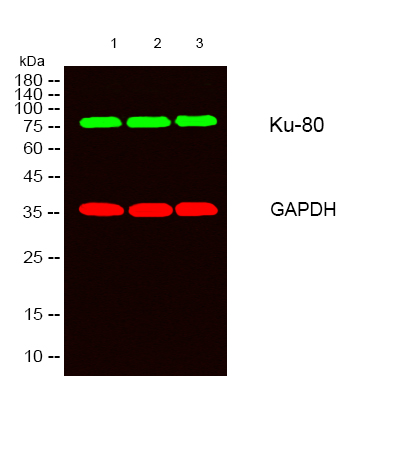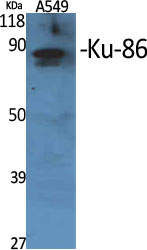PDGFR α (PTR1303) mouse mAb
- Catalog No.:YM4711
- Applications:WB;IF;ELISA
- Reactivity:Human;Mouse;Rat;
- Target:
- PDGFRA
- Gene Name:
- PDGFRA PDGFR2 RHEPDGFRA
- Protein Name:
- Platelet-derived growth factor receptor alpha (PDGF-R-alpha) (PDGFR-alpha) (EC 2.7.10.1) (Alpha platelet-derived growth factor receptor) (Alpha-type platelet-derived growth factor receptor) (CD140 ant
- Human Gene Id:
- 5156
- Human Swiss Prot No:
- P16234
- Mouse Gene Id:
- 18595
- Mouse Swiss Prot No:
- P26618
- Rat Gene Id:
- 25267
- Rat Swiss Prot No:
- P20786
- Immunogen:
- Synthesized peptide derived from human PDGFR α. AA range: 300-400
- Specificity:
- This antibody detects endogenous levels of PDGFR α protein.
- Formulation:
- PBS, 50% glycerol, 0.05% Proclin 300, 0.05%BSA
- Source:
- Mouse, Monoclonal/IgG1, kappa
- Dilution:
- WB 1:500-2000. IF 1:100-500. ELISA 1:1000-5000
- Purification:
- Protein G
- Concentration:
- 1 mg/ml
- Storage Stability:
- -15°C to -25°C/1 year(Do not lower than -25°C)
- Other Name:
- Platelet-derived growth factor receptor alpha (PDGF-R-alpha) (PDGFR-alpha) (EC 2.7.10.1) (Alpha platelet-derived growth factor receptor) (Alpha-type platelet-derived growth factor receptor) (CD140 antigen-like family member A) (CD140a antigen) (Platelet-derived growth factor alpha receptor) (Platelet-derived growth factor receptor 2) (PDGFR-2) (CD antigen CD140a)
- Molecular Weight(Da):
- 175kD
- Observed Band(KD):
- 190kD
- Background:
- platelet derived growth factor receptor alpha(PDGFRA) Homo sapiens This gene encodes a cell surface tyrosine kinase receptor for members of the platelet-derived growth factor family. These growth factors are mitogens for cells of mesenchymal origin. The identity of the growth factor bound to a receptor monomer determines whether the functional receptor is a homodimer or a heterodimer, composed of both platelet-derived growth factor receptor alpha and beta polypeptides. Studies suggest that this gene plays a role in organ development, wound healing, and tumor progression. Mutations in this gene have been associated with idiopathic hypereosinophilic syndrome, somatic and familial gastrointestinal stromal tumors, and a variety of other cancers. [provided by RefSeq, Mar 2012],
- Function:
- Tyrosine-protein kinase that acts as a cell-surface receptor for PDGFA, PDGFB and PDGFC and plays an essential role in the regulation of embryonic development, cell proliferation, survival and chemotaxis. Depending on the context, promotes or inhibits cell proliferation and cell migration. Plays an important role in the differentiation of bone marrow-derived mesenchymal stem cells. Required for normal skeleton development and cephalic closure during embryonic development. Required for normal development of the mucosa lining the gastrointestinal tract, and for recruitment of mesenchymal cells and normal development of intestinal villi. Plays a role in cell migration and chemotaxis in wound healing. Plays a role in platelet activation, secretion of agonists from platelet granules, and in thrombin-induced platelet aggregation. Binding of its cognate ligands - homodimeric PDGFA, homodimeric
- Subcellular Location:
- Membranous
- Expression:
- Detected in platelets (at protein level). Widely expressed. Detected in brain, fibroblasts, smooth muscle, heart, and embryo. Expressed in primary and metastatic colon tumors and in normal colon tissue.
- June 19-2018
- WESTERN IMMUNOBLOTTING PROTOCOL
- June 19-2018
- IMMUNOHISTOCHEMISTRY-PARAFFIN PROTOCOL
- June 19-2018
- IMMUNOFLUORESCENCE PROTOCOL
- September 08-2020
- FLOW-CYTOMEYRT-PROTOCOL
- May 20-2022
- Cell-Based ELISA│解您多样本WB检测之困扰
- July 13-2018
- CELL-BASED-ELISA-PROTOCOL-FOR-ACETYL-PROTEIN
- July 13-2018
- CELL-BASED-ELISA-PROTOCOL-FOR-PHOSPHO-PROTEIN
- July 13-2018
- Antibody-FAQs

